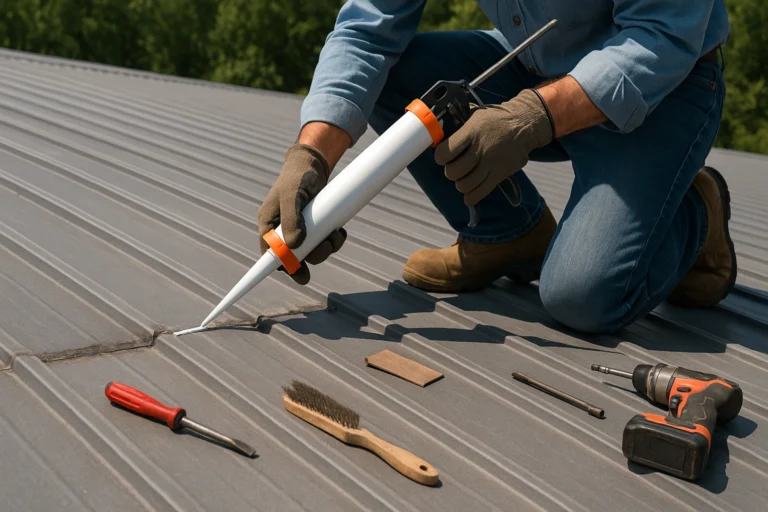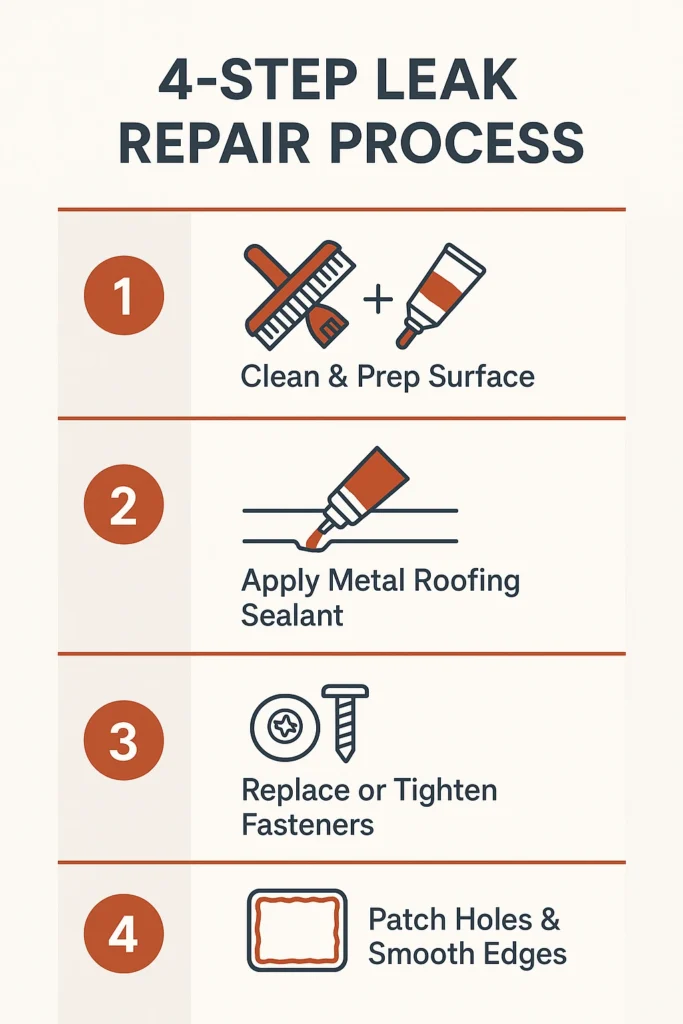Things to Consider Before Opting a Roof Restoration
- Blog
- July 17, 2025

Metal roof leak repair is an essential skill for any homeowner or property manager with a metal roof. Whether you’re dealing with a sudden metal roof water leak repair after a storm or performing routine maintenance to prevent future issues, this guide covers every step you need. We’ll explore the benefits of metal roofing, common problems, how to identify and fix leaks, preventive measures, and when to call in a professional.
Table of Contents
ToggleWhy Choose Metal Roofing?
Metal roofs are increasingly popular across residential and commercial properties. Here’s why:
Longevity
A well‑maintained metal roof can last 40 to 70 years without replacement.Durability
Metal stands up to heavy rain, snow, hail and high‑wind events far better than many other materials.Energy Efficiency
Reflects solar heat, reducing air‑conditioning demands in hot climates.Low Maintenance
Fewer repairs are needed compared to asphalt shingles or tile.
Common Metal Roof Issues
Even the sturdiest metal roof can develop issues over time. Watch for:
Seam Failures
Seams expand and contract, leading to sealant cracks or separation.Corrosion and Rust
Moisture exposure can lead to rust spots that weaken panels.Loose or Missing Fasteners
Screws and washers can back out, creating entry points for water.Damaged Flashing
Flashing around chimneys, vents or skylights can pull away or crack.Punctures and Holes
Falling debris or foot traffic can leave small holes that grow if unchecked.
If you find debris on your roof, consider scheduling our professional roof and gutter cleaning service to keep drainage clear and prevent leaks before they start.
Pinpointing Leak Sources
A methodical inspection helps you locate leaks before they worsen:
Visual Roof Walk
Wear non‑slip shoes and safety gear. Look for rust spots, loose fasteners, cracks in seams and any obvious damage.Inspect Flashing
Check around chimneys, vents, skylights and roof edges for gaps or sealant failure.Examine Roof Penetrations
Pipes, vents and equipment mounts should have intact gaskets or sealant. Any crack here can let water in.Fastener Check
Identify loose, missing or damaged screws and washers. Fastener holes often become leak origins.Interior Clues
Inside the attic or ceiling, dark water stains or mold indicate ongoing leaks—even small ones.
Addressing metal roof leaks promptly is crucial to avoid costly damage. Learn more about how roof leaks can seriously affect your home.
Tools & Materials You’ll Need
Tools
Drill or screwdriver
Wire brush
Medium‑grit sandpaper
Caulking gun
Step ladder or roof ladder
Safety gear (gloves, goggles, non‑slip shoes)
Materials
High‑quality metal roofing sealant
Polyester seam‑fabric (optional for high‑movement seams)
Replacement screws and washers
Metal patch panels (for large punctures)
Rust‑inhibiting primer and paint
Gather everything before you climb up—it saves trips and keeps you safe.

Step‑by‑Step Leak Repair Process
Follow these steps in order for the best results:
1. Resealing Seams and Joints
Clean Surface
Use a wire brush and sandpaper to remove rust, old sealant and dirt.Apply Sealant
Lay a continuous bead of metal roofing sealant along the seam.Optional Reinforcement
For seams that move a lot, embed polyester fabric over the wet sealant, then cover with another sealant layer.
2. Fixing Flashing
Minor Gaps
Apply sealant into any visible gaps or cracks. Smooth with a putty knife for uniform coverage.Severe Damage
Remove old flashing, clean the substrate, install new flashing, and seal all edges liberally.
3. Repairing Fasteners
Tighten Loose Screws
Use your drill to snug any screws that have worked loose—avoid over‑torquing.Replace or Upsize
Remove stripped or missing fasteners. Plug the old hole with sealant, then install a slightly larger screw and washer.
4. Patching Holes and Punctures
Small Punctures
Clean the area, apply sealant directly over the hole, and smooth it out.Large Holes
Cut a matching metal patch, pre‑drill holes, secure with screws, and seal the entire patch perimeter.
By following these steps, you can effectively repair metal roof leaks and enhance your roof’s longevity. If the damage is beyond DIY, professional intervention is the best course of action.
Preventive Maintenance Tips
Prevent metal roof leaking in the future by adopting these habits:
Biannual Inspections
Especially after storms, look for loose fasteners, sealant failures, rust or debris buildup.Keep It Clean
Remove leaves, branches and dirt. A regular roof and gutter cleaning service prevents water pooling.Touch‑Up Paint
Scrape rust spots, prime and paint within 30 days to stop corrosion.Gutter Maintenance
Ensure gutters and downspouts are clear for proper drainage off the roof.
Preventive maintenance is the key to avoiding metal roof leaks—learn more about our full roofing services.
When to Hire a Professional
Homeowners can handle many fixes, but call a pro if you see:
Multiple Leak Points
Widespread leaks suggest a more complex issue.Structural Damage
Sagging panels or underlying wood rot require expert evaluation.Safety Concerns
If working on a high or steep roof feels unsafe.Warranty Work
Some warranties cover only certified contractors.
A qualified roofing contractor will have the tools and experience to restore your roof efficiently and safely.
FAQS
-
1. How much does metal roof leak repair cost?
Costs vary by leak complexity. Simple sealant repairs often run $100–$300, while panel replacements or extensive patching can reach $500–$1,200.
-
2. What’s the difference between metal roof leak repair and steel roof leak repair?
Both follow similar steps, but steel roofs may need additional anti‑corrosion treatments. Other metals like aluminum resist rust better.
-
3. Can I use silicone sealant for flat metal roof leak repair?
While silicone works, a specialized metal roofing sealant designed for UV and temperature extremes offers better longevity.
-
4. How do I fix a metal roof seam leak?
Clean the area thoroughly, apply a high‑quality metal roofing sealant into the seam, and—if needed—embed seam‑fabric for extra flexibility.
-
5. What causes metal roof leaking around fasteners?
Loose screws, worn washers or improper installation. Tighten or replace fasteners and seal holes to sop leaks.
-
6. Is metal building roof leak repair different than residential?
Commercial panels are often larger and may require specialized equipment. However, basic sealing, flashing and fastener techniques remain the same.
Need Professional Roof Help?
If you’re concerned about your roof’s condition, we’re here to help:
Discover how roof leaks can seriously affect your home and why immediate action is important
Schedule our professional roof and gutter cleaning service to prevent leaks before they start
Get expert assistance with leaking roof repairs across Melbourne
Explore our complete range of roofing services for all your roof needs
Contact us today for a free, no‑obligation roof assessment and quote.
If you want a thorough and safe roof cleaning, don’t hesitate to reach out to us for expert services. We can handle everything from roof cleaning to roof restoration.
- 0434 783 593
- info@roofrestorationnorthernsuburbs.com.au
- 32 Milleara Road Keilor East VIC 3033
- Mon-Sat : 8AM – 5PM
